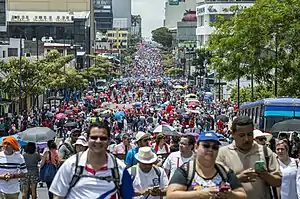2018 Costa Rican protests
The 2018 protests in Costa Rica was a civil conflict that took place in the Central American country, Costa Rica for 93 days, after the trade unions went on an indefinite strike against the tax reform bill promoted by the Executive Branch in the Assembly Legislative.[1]
| 2018 protests in Costa Rica | |
|---|---|
 Mass rallies and demonstrations in Costa Rica | |
| Date | September 10, 2018 – December 11, 2018 |
| Location | |
| Caused by |
|
| Goals |
|
| Methods | Demonstrations |
| Resulted in |
|
Background
The government of Luis Guillermo Solís Rivera presented to the Legislative Assembly on November 9, 2017 the project called "Law to Strengthen Public Finances", which transformed the Sales Tax of 13% into a Value Added Tax (VAT ) of 15%, including a reduced rate of 5% and a tax of 4% for private health and education services.
The initiative also introduced reforms in the field of Income Tax to regulate the income generated by passive capital income, taxing them with a 15% tax. It also excluded as non-deductible expenses from the gross tax payable, the expenses of operations carried out with persons or entities resident in countries or territories classified by the Tax Administration as tax havens or non-cooperating jurisdictions. The project began to be processed in Congress and on February 28, 2018 the deputies approved with 39 votes in favor and none against a special and rapid procedure authorized by Article 208 bis of the Legislative Assembly Regulations, which allows shortening processing times for projects that do not require a qualified majority of 38 votes to be approved. The approval of the fast track removed the project from the procedure of the Tax Affairs Commission and in its place, a special commission dedicated solely and exclusively to the analysis of that project until its final processing was formed. Despite this measure, the bill received hundreds of motions from opposition deputies, which prevented it from being voted on during the Solís Rivera administration. After winning the presidential elections of April 2018 in the second round, Carlos Alvarado Quesada asked Congress to continue processing the tax reform. The new deputies, who took office on May 1, 2018, modified procedure 208 bis to re-enable the space for the presentation of motions (proposals to modify the text), but not before making the Minister of Finance, Rocío Aguilar Montoya, appear before the Plenary of the Legislative Assembly in a session of political control to defend the government's plans in terms of control of public spending, increased collection and to defend the need for the project. The start of the strike coincided with the arrival of the text of the bill to the Plenary for discussion and voting in two debates that the Political Constitution of Costa Rica demands for ordinary initiatives. The procedure established that the motions of reiteration (motions that reiterated in the Plenary a substantive motion rejected in the Commission) should be known by the deputies in the Chamber of Deputies. In total, 373 motions were reiterated, all voted between October 1 and October 4, 2018 to finally give way to the discussion on the fund in the first debate. On October 5, 2018, 35 of the 57 deputies present approved the bill in the first debate. Immediately, the president of Congress, Carolina Hidalgo Herrera, ordered the publication of the updated text in the Official Gazette, as well as consulting it with various institutions and organizations, including the full magistrates of the Supreme Court of Justice. During the time of the consultations, the project remained frozen in its process. However, the strike continued uninterrupted.
Protests
The protest movement started on September 10, 2018 and culminated on December 11 of that same year, when the unions of the Judicial Power (the only ones that were on strike for that date) deposed the movement. The extent of the strike caused severe effects on the provision of services in medical centers, schools, colleges, universities, fuel distribution, trials, hearings and other judicial processes and interrupted the passage through important national routes.[2]
The strike was constituted as the longest social conflict in the history of Costa Rica, surpassing the general strike of the year 2000 against the "Combo del ICE". The magnitude and duration of the movement produced a contraction in the growth of the country's nominal GDP of 0.4 percentage points, generated 13 8billion colones in losses and sparked a national debate on the scope and limitations of the right to strike, because The courts of justice took considerable time to issue the sentences that qualified as legal or illegal the different protests in the different state institutions.[3]
The strikes also recorded acts of violence, clashes between police and strikers, attacks on infrastructure and state buildings, including the Costa Rican Oil Refinery and the Ministry of Finance, as well as an attack on the President of the Republic, Carlos Alvarado Quesada, in the middle of a public highway.[4]
See also
References
- "Costa Rica shaken by rare and unruly unrest, labor strike". AP news. 14 September 2018.
- "Sparks of violence on third day of tax-reform protests". Tico Times. 13 September 2018.
- "Costa Rica: Protesters confront President Alvarado over tax bill". Al Jazeera. 4 October 2018.
- "Strikes, Protests & Road Blocks – Explained & Summarised". Costa Rica guide. September 12, 2019.